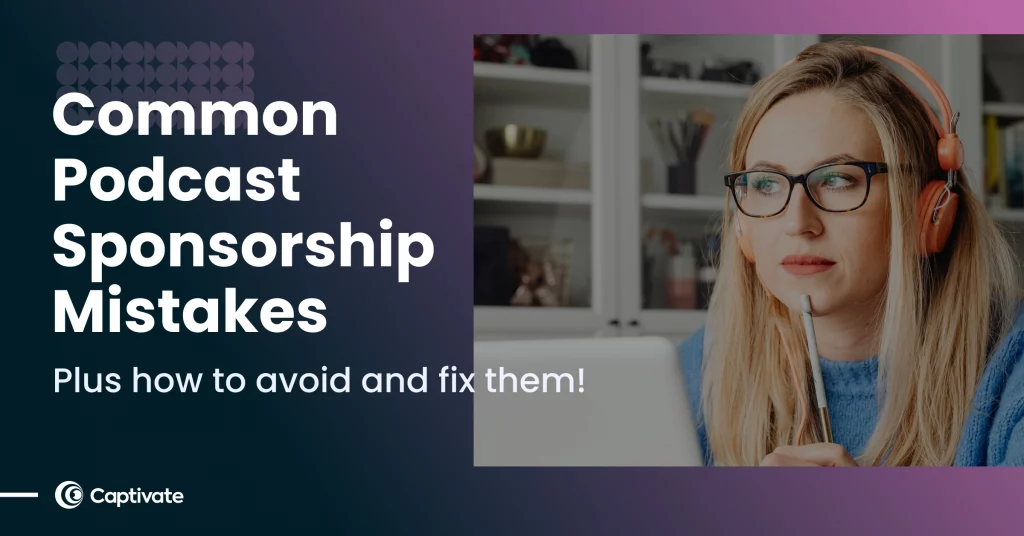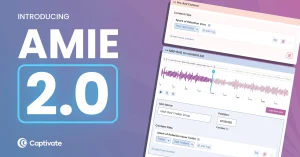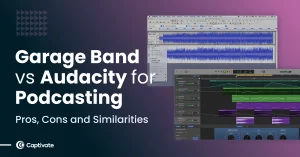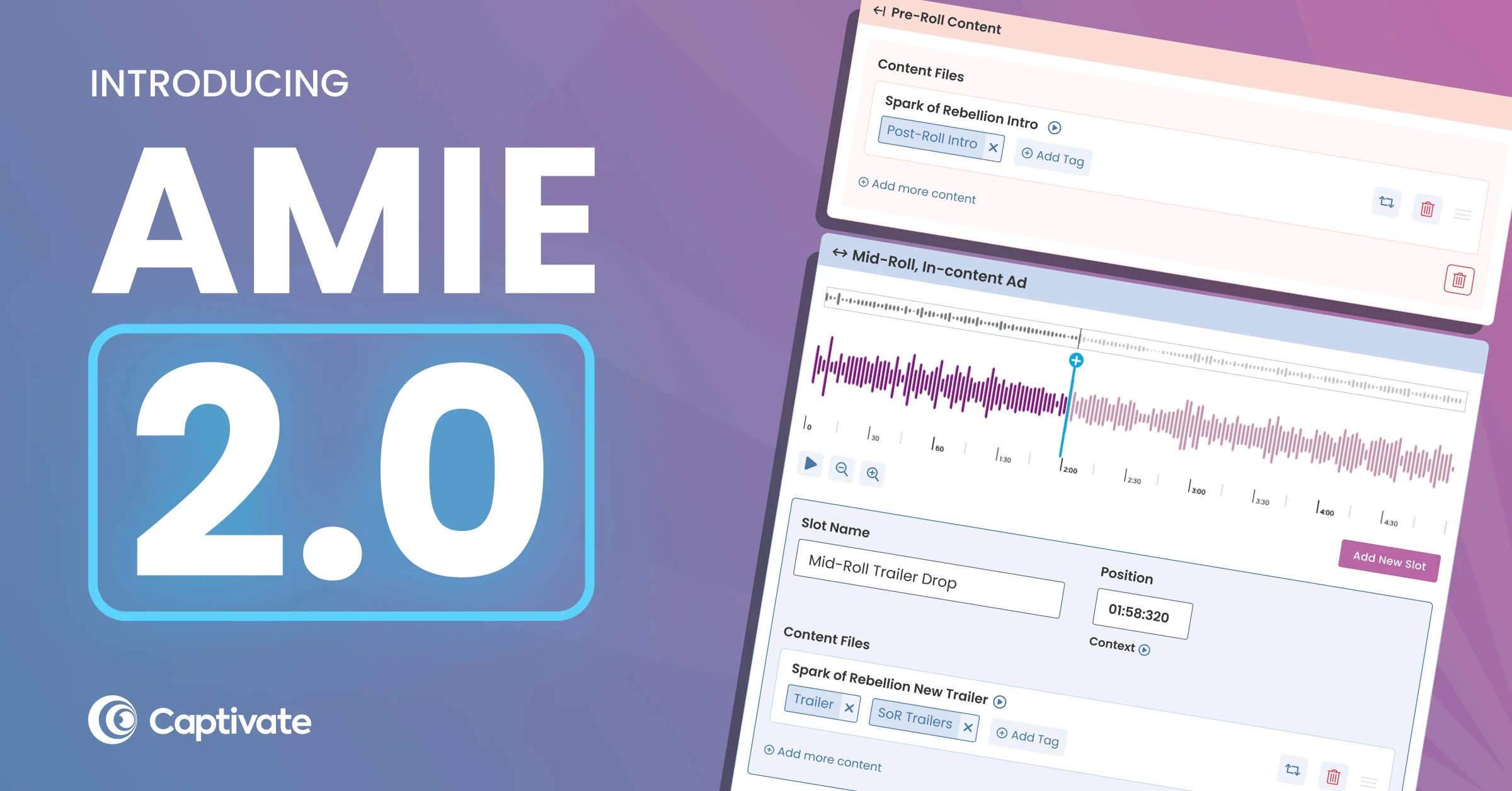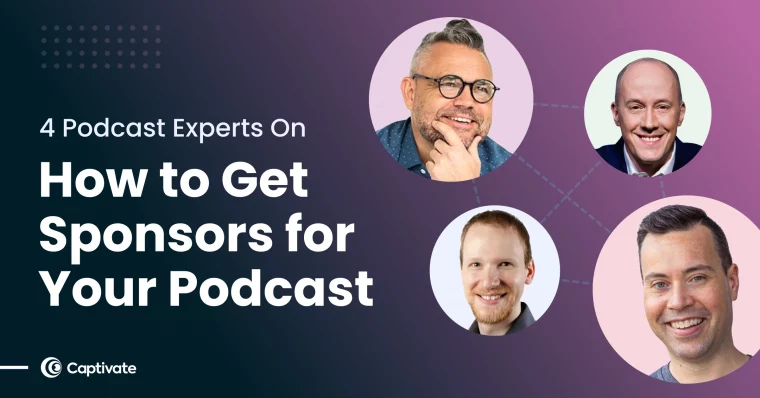Podcast sponsorship is a key goal for the vast majority of podcasters – but what’s the right way to go about it? We’ll break down what you’re doing wrong with trying to get sponsorship for your podcast and the steps you can take to get it right.
In this article...
What is a Podcast Sponsorship?
Getting your podcast sponsored means securing an advertiser willing to pay you to endorse, or air their endorsement, of their product or service on your podcast. Typically, thanks to dynamic ad insertion, a sponsorship will last for an agreed period of time, and will involve their advertisement being played across all of your back catalogue, and you’ll then swap the advertisement out when that time is over. Alternatively ads can be ‘baked-in’ to episodes, but dynamically is usually the preferred method as it offers more flexibility and benefits for both parties.
The sponsor and podcaster will between themselves agree on terms of the sponsorship – stuff like the length of the sponsorship, what’s included, legalities etc, culminating in the signing of a mutually agreeable contract.
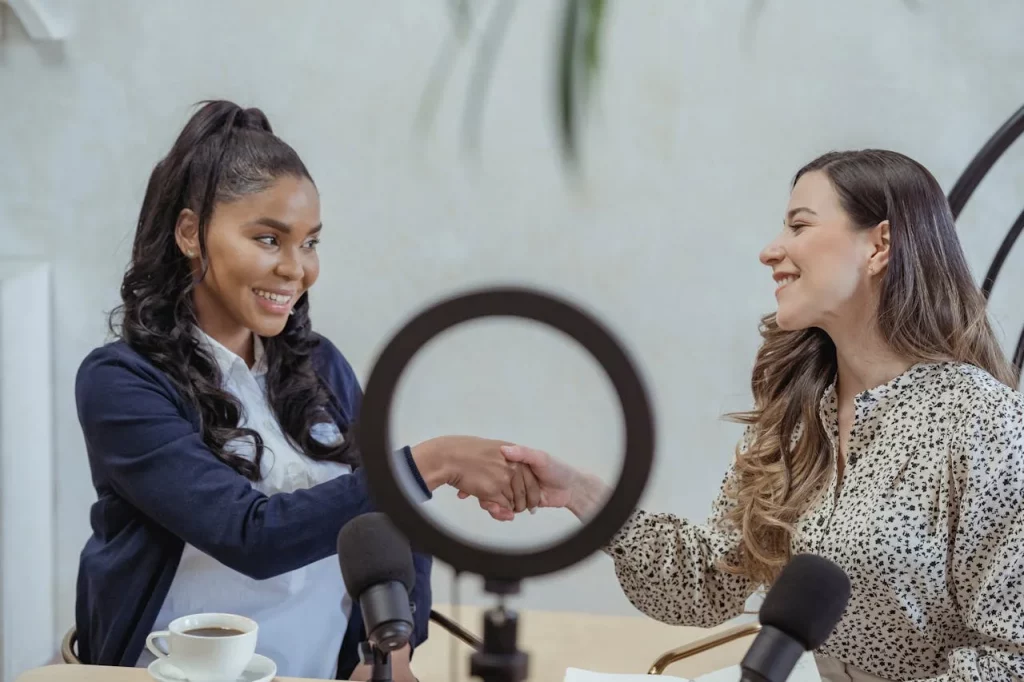
The two main formats a sponsorship can take are:
Host Read: This is where you, the podcast host, will read out the endorsement as part of the episode. This helps to take advantage of the trust relationship between yourself and your audience, and gives you room to talk about your personal experience with the brand and why you’re recommending it.
Pre-recorded: This is where the sponsor simply provides you with the advert they’d like you to play, and you slot it into your episode. Advertisers are sometimes keen to do this to ensure they maintain complete control over their message and brand image.
How do you get sponsorships for podcasts?
You can score a sponsor in a number of ways, but one of the big ones is establishing yourself as a trusted voice within your niche and subsequently reaching out to brands within that same niche. As a general rule, you’ll have far more success if you’re going after products and services with the same target demographic as your own, as you’ll be able to empirically show them who you’re reaching and that they are engaged with your content.
Loads of podcasters make the same common mistakes when reaching out to potential sponsors – we’re here to fix them.
Let’s have a closer look at what not to do…
Podcast Ad ScriptEasy-To-Implement Template
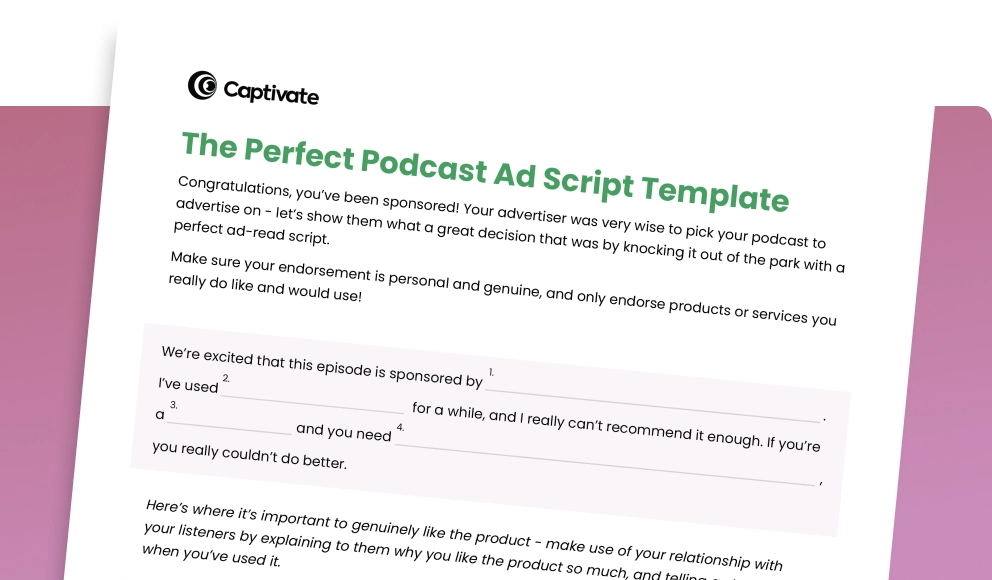
Download The Perfect Podcast Ad Script Template right now,
for free!
"*" indicates required fields
100% secure. We never share your email
7 Common Podcast Sponsorship Mistakes
Neglecting your podcast avatar
Your podcast avatar is your target demographic personified – they’re a single person who embodies all of the characteristics you know about your audience: age, gender, job, income, hobbies, lifestyle and everything else.
You should have them at the forefront of your mind when you’re considering sponsors to work with – what products or services would they actually be interested in, and be willing to spend money on?
For example, if your podcast is all about modernist literature, it would make sense to accept a sponsorship from someone like Audible, but perhaps not from Gillette.
Similarly, if your podcast is about graphic design on a budget, whilst you may love Adobe Illustrator, it’s not a good fit for your audience. Canva, inexpensive and super easy to use, is a much better option.
Spray gunning
Spray gunning is an industry term for reaching out to everyone you know with a product or service and asking them to sponsor your podcast. There are a couple of reasons why this is generally a pretty bad idea:
You’ll end up with sponsors with no relation to your subject matter, and therefore no connection with your audience.
You’ll erode your credibility with all of these brands. In podcasting, like life, desperate isn’t a good look.
You won’t have time for personalization, so your message will be more likely to be ignored. A generic pitch will blend in with the others, rather than standing out.
Poor pitch
When you’re pitching to a sponsor, take the extra time to make it personal and engaging – you’ll have a far higher chance of success if they feel like you really want them to sponsor you, instead of that you just really want a sponsor.
Sending out a really generic pitch to 50 potential sponsors is going to get way less engagement than crafting a unique pitch to 10. You also need to make sure you’re selling – tell the recipient how and why working with you would benefit them. The tone shouldn’t be you asking for a favour, but rather you offering them a great opportunity!
Make it clear who your audience is, why they’re a perfect fit for their brand and prove they’re engaged. This is all very tempting for sponsors, making it hard for them to say no.
Get them to believe in your podcast, explain how you are different to the competitors and what you have achieved – get them bought in with your ‘why’ and USP.
Not following up
It’s not rude to send a follow up email if you’ve not got a reply within a few days. Your original message could have got lost, or the recipient could just have been really busy, so a friendly chaser can be a deal closer!
If you send two or three without a response, though, it’s probably not to be. Don’t be too pushy or take it personally. Move on to the next potential sponsor, and slightly tweak what you did last time to see if you get better results.

Not having a sponsorship proposal package
A proposal package, also known as a media pack or press kit, is a summary of your reach and audience imprint. It’s intended to sell your show to potential advertisers – you should include what the podcast is about, the demographic you’re targeting, and then your monthly and yearly averages, alongside your best performing episodes.
Other information you could include is listeners reviews, media mentions and other ways to demonstrate your reach, like your social media following, newsletter sign ups and other signifiers of your profile.
Another article we think you'd like...
Reading Time: 10 minutes Learn everything you need to know about Dynamic Content & Ad Insertion including what it is, how to use it and how it benefits podcasters!
Everyone will ask about costs, so make sure to include a breakdown of the different packages you offer. They may wish to negotiate, which is completely down to you.
If you’re a Captivate podcaster, we’ll take all your analytics data and make a perfect sponsor kit for you, giving you that professional edge with none of the hassle.
Thinking a brand is too big to approach
No brand is too big to approach. Even the big brands will be interested in having access to a smaller engaged audience; people who will actually check out their products and services after listening to an episode. Especially if they’re aware of the fact that 48% of listeners trust podcast hosts more than other media.
Another factor to bear in mind is bigger brands have a budget, and if they don’t spend it they lose it, making it much easier to get that yes!
Doubting your numbers
You don’t need crazy numbers to impress advertisers – it’s about how engaged your audience is. If you can demonstrate that your listeners trust you and engage with you, you’ll go far with sponsors.
A great way to do this is with Captivate’s Attribution Links – you can actually track who’s clicking through links, so you can show advertisers exactly how much engagement your sponsor links receive.
How much do podcast sponsors pay?
There’s no industry standard and no official guidance – since, as a podcaster looking for monetization, you’re essentially an entrepreneur, it’s down to you to decide how much to charge.
There’ll be some trial and error and negotiation, and it’s wise to do some market research amongst people with podcasts of a similar size and genre to your own. All that said, let’s have a look at what some of those who work at Captivate charge sponsors for their own personal podcasts, to give you an idea of the range.
How much should you charge?
For his old show, Podcaster Stories, Captivate Head of Support, Danny Brown charged around $50 per slot (there being two slots in each of his pre-roll, mid-roll and post-roll sections).
If sponsors wanted to sponsor his back catalogue, he charged $80 per slot.
Sarah McDowell, Captivate’s SEO manager, prefers to charge per season. Her show, the SEO Mindset, offers sponsors different packages. To be a full-season sponsor with all the bells and whistles she charges £3000 – and that’s for a show that pulls in around 800 downloads per month. Alternatively, she offers sponsors a half-season package for £1500.
These numbers aren’t a guide you should follow, necessarily, just real-world examples of the different ways you can charge and the amount of money that some niche podcasts can make.
After a Podcast Sponsorship Ends: Next Steps
After your agreed upon sponsorship period is over, it’s time to thank your sponsor and part ways professionally and amicably. If it went well, feel free to follow up with more opportunities and politely ask to be connected with any others who may be interested. Word travels, so just make sure to be pleasant and professional at all times.
FAQs
- What types of podcast sponsorship are there?
The most common sponsorship types are pre-roll (before the main episode audio), mid-roll (at some point within the podcast) and post-roll (after the main episode audio). There’s also sponsored or featured segments, wherein an advertiser will sponsor a specific recurring section of your show, like a Q&A, or an industry news round up.
- Are host read ads better?
Host read ads benefit from the relationship and trust between the podcast host and the listeners, and allow the host to deliver the advertisement with less of a disruption to the podcast. Pre-recorded ads, supplied by the sponsor, allow the sponsor more control over the content and tone – so there are benefits and drawbacks to both, and it’s entirely down to you and the sponsor to decide what’s going to work for you.
- Should I disclose podcast sponsorship content?
Yes, always disclose content which has been paid for by a sponsor. Sneakily adding in a product or service will undo the trust you’ve built with your listeners when they find out you’ve been paid for endorsement.
Just say something as simple as: , “this season/episode is sponsored by [brand]” or “this is featured content sponsored by [brand].
- Is sponsorship the best way to make money?
Sponsorships are a tried and tested organic way for podcasters to make money. It’s essentially the same idea as a TV or radio ad, which have been around for decades. There are other ways, too, though – podcasters can sell premium content and exclusive episodes, as well as merch. It’s best to have as many revenue streams as possible!
Takeaway
Getting a sponsor is a key goal for the vast majority of podcasters, and it’s not reserved just for those getting thousands of downloads a day. Target advertisers with a similar target demographic to your own and approach professionally with clear examples of your reach and download numbers and you’ll snag a sponsor in no time.
As long as you think about your avatar, nail your pitch and follow up, you’ll soon get that all important, yes! And remember, no brand is too big and stop doubting your download numbers.
Don’t be afraid to negotiate on price, and make sure to do your research with regards to sensible rates, and you’re well on your way to monetizing your podcast.
Podcast Ad ScriptEasy-To-Implement Template

Download The Perfect Podcast Ad Script Template right now,
for free!
"*" indicates required fields
100% secure. We never share your email

